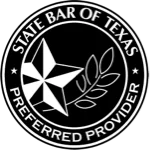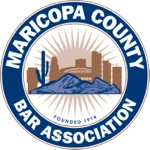If you’ve stumbled upon this guide, chances are you’re either contemplating or are already knee-deep in the process of designing a website for your law practice. Congratulations! We love a good website project.
Over the past 15 years, we’ve developed thousands of websites for law firms specializing in just about every area of law. We build sites that help to make a powerful first impression with clients, referrals and even opposing counsel. The secret to a really great website? Strategy, empathy for your visitor and data-driven design.
In this chapter, we’ll dive into strategy and the steps your firm should take to ensure your website resonates with its target audience.
Building a User-Centric Attorney Website: Start With the Basics
A user-centric or client-centric attorney website is a website that is designed with the user persona in mind. You, the attorney, are not the user. So, before you can successfully create a site that will generate more leads or serve your current clients, you must clearly define your ideal client and the associated buyer persona(s).
Once you have developed a persona, you can then make consistent decisions that will serve your user. Your website needs to work for you and your business, of course—but if your target user cannot successfully navigate your website, then why would they hire you?
By the end of this section, you will understand the first step in designing a user-centric attorney website: defining your user or users.
Let’s get started.
Identify the goals of your law firm’s website
Websites can support a business in a variety of ways. Before you define your users, let’s take a moment to identify the goal(s) of your website, where the website fits into your business, and how your users will interact with your website.
Here are three goals that a website could help you achieve:
- Generate business
- Validate referrals
- Establish yourself as a thought leader
Now, let’s consider your website goal in the context of a person’s journey from awareness to consideration to a decision to hire you.
If your legal website is the very first interaction that a potential client or colleague has with your brand, your website should aim to move users from awareness to consideration. This might be true if you are focusing on search engine optimization, keywords, and organic traffic.
On the other hand, your website might be the second interaction if your business is primarily built on referrals. At this stage, the user has chosen to visit your website so they are already considering you. If this is your primary strategy, your website should aim to move users from consideration to decision.
ACTION Choose three goals for your website and rank them in order of importance.
Develop an ideal client profile and buyer persona
Now that you know how the website will serve your business, you can use these goals to determine your users:
- Generate business → Prospects
- Validate referrals → Prospects, colleagues
- Establish yourself as a thought leader → Other legal professionals, sophisticated clients
To design a successful website, you need to understand both who your ideal client is and how they make purchasing decisions. This section will help you create an ideal client profile (ICP) to describe the who and a buyer persona to describe the how.
Ideal client profile—the who
This is a rough outline of who your ideal client is, both in their own world and in the context of your business. Start by describing the demographic characteristics and motivations of an ideal client. You may have several different personas.
- Who are they externally?
- Who are they internally?
- What are their primary pains?
- What are their primary goals?
- What do they think, feel, see, hear, say, and do?
Now let’s add more details. How would you describe the ideal client in the context of your law firm? Remember, your ideal client should be ready, willing, and able to work with you. If you are stumped, think back to previous clients and compare your happiest (and unhappiest) former clients.
- How did they find my business?
- What makes them choose to work with me?
- Why would they choose to make referrals to me in the future?
You should now have a clear picture of your ideal client in mind. Some people like to name their personas for quick reference, like Plaintiff Priya and Defendant Donald. Create a user persona document that describes the persona.
Make sure everyone in your office is comfortable with these personas. Name them and refer to them often in conversations around business development. Some companies go even as far as having lifesize cardboard cutouts of them around the office (attorneys beware, this may alarm clients visiting the office).
ACTION Create one or more ideal client profiles with names and key information.
Buyer persona—the how
Now you know who your ideal client is—but how does your ideal user act when they are in the process of buying something? Your website is a sales tool and you should build your website around your user’s buying behavior.
To create your buyer persona, think of your ICP. Now, let’s consider what kind of information may motivate them to hire you. For instance, did you know that 90% of people report that video helps them make buying decisions?
- Is the buyer persona more motivated by analytics or anecdotes?
- Is the buyer persona more motivated by credentials or social proof?
- Is the buyer persona more motivated by formal or informal communications?
The image below is a good example of a persona template that can be used to compile this information and serve as a starting point for your audience development.
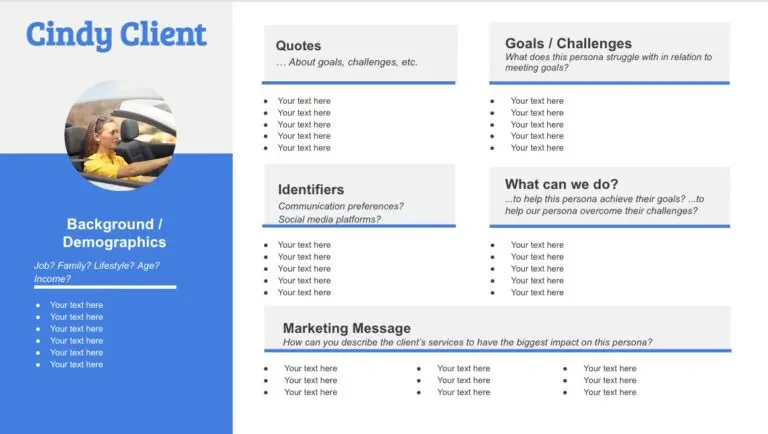
Your buyer will perform a variety of actions as they consider working with your law firm. These actions are called buying signals and they typically escalate from awareness to consideration to decision. They may start with reading your FAQs and then escalate to booking a free consultation, for example.
Once you have a buyer persona, you can design a website that moves people towards making a purchase by anticipating their buying-related questions.
ACTION Create one or more buyer personas with their motivations and buying signals.
How is attorney selection influenced by the persona?
Attorney selection is a decision-making process. A potential client carefully evaluates you and your business before reaching out—and your website plays a major role in this evaluation.
- Is this attorney trustworthy?
- Is this attorney experienced?
- Is this attorney skilled in the area where I need help?
Anyone can create a legal website that explains why they’re the best attorney in the world. But your ideal client makes decisions in a particular way. Once you create a specific user persona, you can design a digital experience that delivers the unique “how” and the “what” they need to know to confidently select you as their attorney.
Design your law firm’s website with your persona in mind
Now you have all the information you need to design a user-centric attorney website.
Your ideal client profile will guide the style of your website. This means colors, font, and the tone of the text. For example, if your ideal client is motivated by luxury, you might lean into color theory and use black and gold. You could take a more formal tone and write a third-person biography.
Your buyer persona will guide the specific content and experience of your website. This includes text, video, and the user tasks which are most important. If your ideal client is motivated by analytics and videos and their primary goal is to book a free consultation, you could embed a short introduction video beside a chart with your success rates on your Contact page.
ACTION Identify several design choices for your website based on your personas.
Review and next steps
Here are the action items from this section:
- Choose three goals for your website and rank them in order of importance.
- Create one or more ideal client profiles with names and key information.
- Create one or more buyer personas with their motivations and buying signals.
- Identify several design choices for your website based on your personas.
With this foundational work done, you are well on your way to designing a successful attorney website! Next, we’ll explore how to select the right digital marketing agency to help you in this process.
How to Select a Website Designer for Your Law Firm: Narrowing the Field
You now have an ideal customer profile and some design ideas for your attorney website. It’s time to look for a designer to bring your digital vision to life. So, what do you need to know before you pick one?
There are a lot of attorney website design agencies out there—but they are not all the same. Before you hire a designer, you need to understand what’s available so you can figure out what you really need.
From scope to skill, every agency offers something different. One agency may offer basic web design services while another offers SEO. Another agency may provide full-service marketing on top of everything else.
By the end of this article, you will understand the three basic types of website design agencies. We also provide a quick guide to help you identify your needs and select the right agency to design your attorney website.
#1 Basic: Agencies that (only) design websites
The first type is entry-level agencies. They provide only the basic elements of a website, which are development and hosting.
Development is a broad term that can include design, layout, programming, and ongoing maintenance. A web development agency will create the appearance and functionality of your website. The agency may use templates or code entirely from scratch.
Hosting is what allows your website to be viewed online. The agency hosts your website on a server, storing the information and updating it live so that others can access it via the Internet.
What these agencies do not offer is marketing assistance, like SEO (Search Engine Optimization) or PPC (Pay-Per-Click) management. This is a small minority of agencies.
Pros of website-only agencies
- Expertise and dedicated focus on website development
- Limited project scope may mean less work for your firm
- Often faster to launch
Cons of website-only agencies
- For firms who want to generate leads from the web, less effective results
- If this is a one-and-done arrangement, you may find it difficult to update your site as your business grows
This type of agency may work for an attorney who simply needs to get a site up quickly. It could also be a good fit if the primary goal of the website is referral validation.
ACTION Review the goals you wrote down for your attorney website—now imagine how your website needs may change in 1-2 years as your business grows. Jot down a few notes about these future needs.
#2 Intermediate: Agencies that provide website design and SEO
This type of agency offers website design as well as marketing services like SEO and PPC.
These agencies often view website design as a vehicle to sell marketing services. To them, website design is a loss-leader. As a result, many of these agencies won’t even sell you a website without ongoing marketing services.
However, there are some benefits to be had by working with a website design agency that also does marketing. When marketing is considered from the beginning, it often leads to a better design—and thus a better experience for your website visitors.
Pros of lawyer SEO agencies
- Better user experience
- Bring in new business with organic leads
- Drives growth
- More data to tweak performance
Cons of lawyer SEO agencies
- More costly
- May take longer to launch
- May not have a deep appreciation for website design
ACTION Consider the primary users of your website. If you’d like to attract new business—but you can’t afford a ton of marketing—you may wish to hire an intermediate agency.
#3 Advanced: Agencies that provide advanced marketing and website design
These agencies do it all!
Full-service agencies sell websites as a standalone service and they also provide a suite of advanced marketing solutions like SEO, PPC, video marketing, social media marketing, and more.
Pros of full-service agencies
- Integrated marketing yields better results
- Delegate marketing so you can focus on the business
- Can grow with the business
Cons of full-service agencies
- More costly
- May take longer to launch
This type of agency is best for long-term (and short-term!) growth. Start with an agency that can do it all and you won’t have to switch agencies in the future when you need to add a service or scale up.
ACTION: Make a list of the activities you want to handle on a day-to-day basis and a list of marketing assets you’ll need in the next year, and even beyond.
Which agency is right for you?
Whew! That’s a lot of information. Let’s pause and simplify.
The right decision for your firm depends on your goals for the website—now and into the future.
It’s crucial to consider now how your website needs may change in the future as your business grows. A good decision now could save your future self a ton of time and money.
Is your firm primarily looking for a basic website that validates referrals? Option #1 or #3 is probably the best route. It doesn’t make sense to hire an aggressive SEO agency. This will cost you a ton of money and likely won’t get the ROI you want.
Is your firm looking for a website that can support marketing? Go with Option #3. A full-service agency is the best option if you’re looking to grow. A one-stop-shop agency can adjust to your needs. You can get help designing your website, setting up PPC and SEO, producing videos, and managing your marketing needs as you accelerate into growth mode.
Review and next steps
Here are the action items from this section:
- Write down how your website may need to function in the future vs. now.
- Re-read your previous notes about the primary users of your website and their needs.
- Create a list of marketing activities you’d like to try.
- On this list of marketing activities, mark which ones you may need help implementing.
Next, we’ll explore vetting marketing providers by asking the right questions in the selection process. This is really important! Hiring the right designer is a critical step toward ensuring that your website functions properly—now and going forward.
5 Questions to Help You Vet a Web Developer for Attorneys
Before you hire a law firm website designer, you should vet them carefully. If you’re not careful, you could wind up with a website that doesn’t represent your firm well.
Hiring the right designer is the best way to guarantee that you get a website you love.
Some of the questions below are ones that you can answer on your own by doing research before you reach out. For other questions, you should ask the designer directly. Your law firm needs an effective site and to accomplish this goal you need to hire the right designer.
By the end of this section, you will be able to confidently vet a website designer across five key criteria: expertise, hosting, accessibility, pricing, and ongoing support.
Let’s dive in!
#1: Does the designer have a portfolio of projects similar to yours?
Websites are as diverse as people. Do you need a simple three-page website or do you need a hardcore website with a ton of back-end functionality?
Make sure your designer has a strong track record of producing the type of website you need.
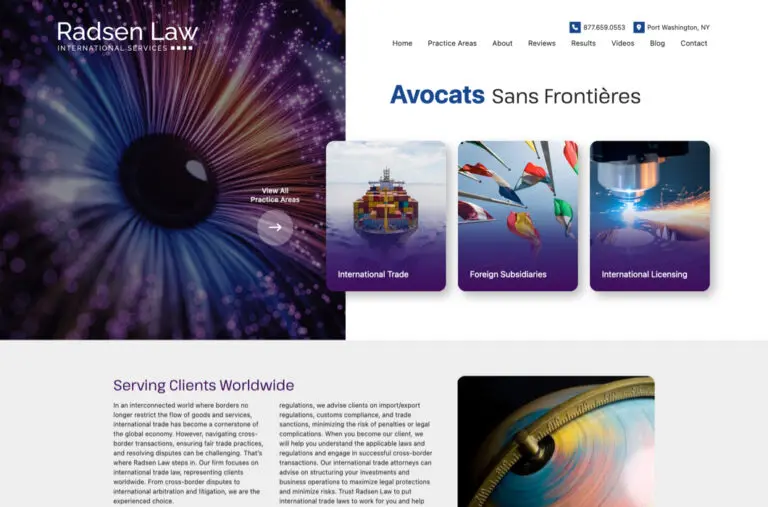
For instance, some website developers rely solely on template designs. If your firm wants something custom, you will need a designer with expert development skills. Custom sites like this can cost anywhere between $7,500 and $150,000, depending on complexity.
ACTION: Thoroughly review a designer’s portfolio to ensure they have the design chops to produce what you want.
#2: Where will the designer host the website?
Most website developers build and host websites on WordPress, today’s Gold Standard for open-source site development and hosting. Let’s say something doesn’t work out with your developer. Instead of rebuilding the site from scratch, you can simply transfer your WP site to a new host.
A minority of attorney website developers host sites on a proprietary platform. This in and of itself isn’t a bad thing. However, you may have less control over the content. Plus, the site will need to be rebuilt if you ever decide to leave—or the host company folds.
ACTION: Decide whether you prefer an open-source or proprietary host for your website.
#3: Can the designer build an accessible (ADA-compliant) website?
Is the site built to be accessible for individuals using assistive technology? This is hugely important given how many Americans have disabilities that impact their web experiences.
All websites should be built in accordance with WCAG 2.0 or WCAG 2.1 Guidelines. From alt descriptions and transcripts to appropriate color contrast, your website should make it easy for every visitor to find what they need. Inclusive design is important for the world and good for your business—plus, it helps with ADA compliance.
ACTION: Ask prospective designers about how they will make your website accessible.
#4: What exactly is included in their price?
If you are spending a big chunk of change on website design, it’s okay to ask for specific details and even an itemized list of what’s included with the service.
For example, if a designer is selling SEO services then a list of itemized deliverables will likely include content production.
You can—and should—ask for even more details. In this situation, inquire about who will actually be producing the content. Do they hire out the writing to freelancers—and are they also attorneys? What is the process for turning out high-quality content? If you are expected to write your own content, that should lower the price significantly.
Note that website fees are often discounted if you add on an accompanying SEO plan.
ACTION: Ask for a detailed breakdown of the package you’re buying so you can see how your money will be spent.
#5: What kind of ongoing support do they offer?
Websites are not one-and-done. You will need to make changes to your site at some point in the future—it’s a normal part of growth.
What is the designer’s process for handling ongoing support for your site?
If it’s DIY maintenance, you may have to log in to create a new attorney profile down the line, for example. But if the designer provides this support, is it included in a monthly package or do you pay per hour? What’s their turnaround time?
This step is key! Without knowing what to expect going forward, you can’t calculate the true cost of ownership.
ACTION Ask the designer what they offer in terms of ongoing support (and how much it costs).
Review and next steps
Here are the five key areas in which you should examine a potential web designer’s ability:
- Review their portfolio to ensure they can produce what you want.
- Decide whether you prefer an open-source or proprietary host for your website.
- Ask how they will make your website accessible.
- Ask for a detailed breakdown of the pricing.
- Ask what kind of ongoing support they offer (and how much it costs).
Next, we’ll discuss how you can make sure your practice is equipped for the development process to maximize efficiency when working with an agency. You’re getting closer!
How To Prepare For A Law Firm Website Development Project
Firms are usually excited to get a new website project started, and understandably so! A new website or a revamp can play a major role in building and maintaining your business efficiently and effectively. If done right, much of the work of marketing your law firm can be handled by the website – your ideal client can find you, learn more about who you are and what you offer, identify answers to their most common questions, and navigate with ease, making them more likely to stay long enough to consider doing business with you and more likely to return in the future or recommend you to someone else.
Too often, though, we see projects stall before completion. It’s typically because they didn’t establish a strong foundation at the beginning of the development process. It’s essential to do the work upfront to create that strong foundation, building consensus on how you’ll approach the project from all of the stakeholders. Without that strong foundation, you run the risk of the project going off the rails before it’s complete or of creating a website that won’t actually meet your needs.
To make this process as seamless as possible, an efficient development process is key.
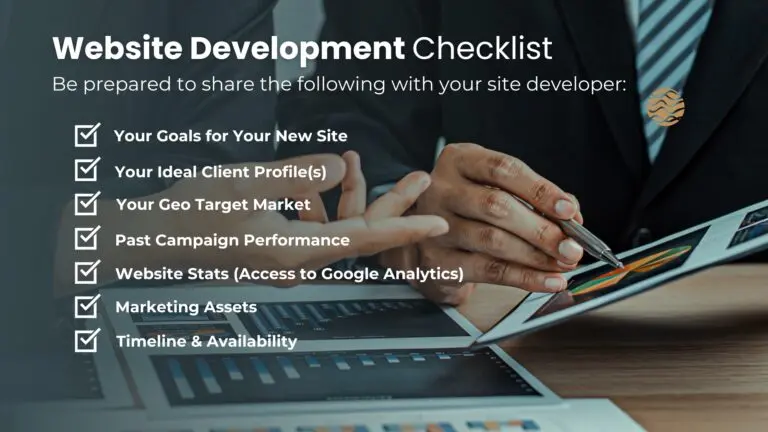
Be prepared to share the following information with your website developer to create a strong foundation for success.
#1: Your Goals
Perhaps surprisingly, too many law practices charge ahead without getting clear on the goal for their new website.
If the goal is lead generation, for instance, your strategy to capture visitor information and your corresponding call-to-action might include a pop-up box with a scheduling tool for a free consultation or complimentary ebook.
If the goal of your website is validation for referrals, a pop-up might actually be seen as a nuisance that dissuades potential clients from learning more about you and booking an appointment. In that instance, focusing attention on staff profiles and testimonials could be more important.
Your ideal presentation will differ, significantly in some cases, depending on your goals.
#2:Your ICP
An ICP, or ideal customer profile, gives you a detailed description of your ideal customer. You’ve probably already articulated your firm’s ICP (if not, you’ll want to scroll up and tackle that exercise first), but it’s essential that your website be designed with your ICP in mind.
Factors such as your ideal customer’s age, familiarity with technology, education, race, gender, and even their hobbies might be considered when crafting a website that will appeal to them and their needs.
What is compelling to some could actually repel other potential clients. Specificity is essential here.
#3: Your Geo Target Market
It’s essential to be realistic upfront about what geographic areas you’re targeting with this website. The recent Google Vicinity Update and search engines in general have made this even more important. Search engines prefer to serve up businesses that are closer to the user – and your ideal client is probably within a specific geographic area (or a few).
The Google Vicinity Update has meant that keywords in things like a business’ name weigh much less heavily than they used to, while proximity is much more important. (This update has really changed the game for the first time in many years.) As you develop the website, it’s best to target areas where your firm has a physical office address.
#4: Past Campaign Performance
There are a few questions to consider as we look at your firm’s history.
- What have your previous marketing campaigns looked like?
- Have you had any great successes in those campaigns?
- Were there any big failures that we can learn from?
There may be some great lessons here that would apply to your website as well as to your larger marketing efforts moving forward.
Keep in mind the context and the ever-changing business playing field as you discuss these with your developer or potential developer.
#5: Current Website Performance
Is your current website performing well? Be prepared to share Google Analytics access and any additional evaluation or performance tracking you’ve done.
This is also an opportunity to consider how the current website is performing from an internal standpoint. How easy has it been to make updates? Have you run into any website issues internally? If clients or potential clients talk about your website to you, what do they say?
#6: Marketing Assets
Ask your developer for a list of the assets they’ll need (as well as any particular standards/formats, if relevant).
Expect and be ready to provide the following:
- Firm colors (style guides are great if you have them!)
- Logo
- Attorney photos
- Office photos
- Staff profiles
- Any additional copy you’d like to include
#7: Timelines
There are two elements to this:
- What does your developer’s availability and turnaround time look like?
- When will you (and any other stakeholders) realistically be able to review deliverables and provide feedback?
Setting a timeline is important, and it can’t be completed until you’ve defined what you can give to the process and when.
Once it’s established, you’ve got a clear outline to use in creating deadlines and tracking progress moving forward.
Next Steps
You’ve now got a clear seven-step process to set up your next website development project with a strong foundation.
Discussing these questions upfront with your developer will result in a more efficient process and a more effective website.
Next, we’ll explore choosing the right domain name for your firm’s new, or redesigned, website. Warning — it may be harder than you think to find one that you like and is available.
Selecting a Domain Name for Your Law Firm's Website
The stakes are incredibly high when it comes to finding a domain name for your practice’s website. Do it right and your domain name will bring in business and build confidence in your brand. Do it wrong and your domain name will confuse clients or send them to the wrong site.
On top of that, it isn’t as easy as you might think to come up with a name. You might dream up a great name—but it’s already taken. Perhaps the official name of your firm includes all three partners’ last names—but that’s far too complicated for prospective clients to remember.
Whether you’re starting a new law firm or revamping your website, choosing the right domain name is important. Domain names should be memorable, easy to spell, and aligned with the firm’s brand, reducing friction on a person’s journey toward finding your website and ultimately hiring you.
This section will help you understand the five key considerations of selecting a domain name for your attorney website. Read to the end for a tool that can help you succeed in the search for the perfect domain name.
Length is important
In general, shorter is better. Sure, it’s tempting to get creative and clever. But modern humans have notoriously terrible memories. Don’t make it any more difficult than necessary for someone to find you!
Which is easier to remember?
- Dedekerlawsonhughandkimattorneysatlaw.com
- jerseycaraccidentlawyer.com
It is highly unlikely that a person will be able to remember a lengthy, complicated domain name without any prior exposure to your firm’s name. Imagine if a prospect sees your URL on a business card that they promptly lose, or a colleague hears about your firm from a friend.
A short domain name is always easier to remember than a long one—and it’s much easier to type into a browser.
Spelling is major
Spelling is very important! Do not use colloquialisms, slang, and abbreviations. Embrace full words like “company” instead of “co.”
You may want to avoid complicated names and words in your domain name, if at all possible. If your first name could be spelled various ways (like Kristina or Christina or Kryzstina) you may want to use your last name instead.
The goal of your domain name is to make it as easy as possible for someone to find your website, especially if they may have to guess the spelling.
Go for the simplest and most obvious spelling of words in your domain name.
The ending matters
Endings are the .org, .com, .biz, or .info at the end of your domain name. They’re also called domain extensions.
The ending does matter! Some domain name endings are perceived to be more credible than others. Studies show that domain extension can actually influence a person’s perception of a company before they even see the official website.
Which is more credible?
- princeton.edu
- princeton.biz
In general, the .com extension offers the most benefits and it’s usually the best choice if it’s available. If your dream domain name ending in .com is not available, it’s not wise to settle for a different extension just to keep the domain name.
Exact match vs. branded
An exact match domain name is one that exactly matches a search query. In other words, if your target client is typing “Pasadena motorcycle accident attorneys” into Google then an exact match domain name would be pasadenamotorcycleaccidentattorneys.com.
On the one hand, it’s true that having keywords in your domain name can be helpful. However, it’s rare nowadays to find an available domain name with good keywords. This strategy often drives firms to select a less desirable domain name.
The other option is a branded domain name where your practice’s brand name is part of the domain. For example, the website for Stein & Shulman, LLC is https://www.steinshulman.com.
Branded domain names are recommended where possible for ease of use.
Future-proofing your domain name
No one can predict the future but firms should think very carefully about their future growth goals before picking a domain name.
For example, if you only have one office location this year but plan to open four more in different cities next year, then you may not want a domain name that is tied to just one city. The same thing can be said for practice areas.
Which is better for future growth?
- www.floridafamilylaw.com
- www.orlandodivorcelawyers.com
It is possible to change a domain name but doing so means you’ll have to rebrand everything and redirect traffic to the new site.
As your site accrues traffic, your domain name gains more credibility with the search engines. Your domain name is also a key part of your marketing strategy. A consistent domain name helps your audience find you (and refer you) over and over again throughout the years.
The best strategy for your business is to pick a good domain name once and stick to it.
Review and next steps
When selecting a domain name for your practice’s website, try to make it as easy as possible for someone to find your site. It is equally important to select a domain name that fits with your brand and does not limit future growth.
Here are the five key takeaways from this section:
- Shorter domain names are easier to remember.
- Go for the simplest and most obvious spelling.
- The domain ending matters, and .com is the most trusted extension.
- Branded domain names are usually better than exact-match domains.
- Choose a domain name that is flexible enough to allow for future growth.
You’re ready to start searching for a domain name! To find out what’s available, go to who.is and start searching.
Next, we’ll turn our attention to defining KPIs…the last step before you dive into the website development process.

Determining the Right KPIs for Your Law Firm's Website
What does success look like for your firm’s website? As you develop your new site, you’ll want to identify key performance indicators (KPIs) to help you monitor the site’s effectiveness.
Tracking performance is the name of the game, whether you’re running a law firm or playing baseball. KPIs help you stay focused on what matters.
When someone hits a home run at a baseball game, the scoreboard numbers change to display the new count. It’s easy to keep track of how the game is going by simply checking the score. Of course, you could also track how many players have goatees—but this data isn’t relevant to the outcome of the game.
The concept of tracking performance also applies to your website. When someone visits your website, a digital scoreboard counts their visit. You could also measure how many comments people leave on your blog but your firm is probably more impacted by the number of people who click through to book a consultation, right?
By the time you finish this section, you will understand what KPIs are, how to pick the right ones for your law firm’s website, and how to keep track of them.
What is a KPI?
KPI stands for key performance indicators. KPIs help you quantify the performance of your website so you can measure its effectiveness over time.
In simpler terms, your website has a lot of data associated with it—and this data will change as you add new content to your site, grow your business, or try new marketing strategies. The sky’s the limit!
For example, you could track the number of inbound leads or your ranking position on the SERP (Search Engine Results Page). Traffic and social shares are two very common KPIs. With the right tools, you can track pretty much anything related to your website.
Each category of data is a KPI.
The key to unlocking the power of KPIs is that you must limit your focus to the KPIs that actually support your business goals.
Which KPIs are the most important?
The goals you have for your website (and your business) determine which KPIs you should prioritize. You should only track the ones that directly impact your goal.
For lead-generation websites, consider tracking:
- Ranking in SERPs for select search queries
- Number of inbound leads (via webform completion, live chat engagements, etc.)
- CPL (Cost Per Lead)
- CPC (Cost Per Case)
For websites that primarily validate referrals, consider tracking:
- Ranking in SERPs for brand searches and attorney name searches
For websites where thought leadership is the focus, consider tracking:
- Traffic to the website
- Backlinks to the website
- Number of shares on social media
ACTION Review the goals you have for your website. Beside each goal, write down a few KPIs that you could track.
How do I keep track of KPIs?
This is the fun part! When you work with a reputable digital agency, the agency can track these KPIs on your behalf.
The first step is to decide which KPIs you’d like to track and how often.
Ensure that the agency is willing and able to track this data and provide regular reports. The frequency of reporting depends on your needs. If you are publishing new blog content every week, it makes sense to review the newest data every week, for instance.
The next step is to monitor the KPIs and work towards improvement.
If you are working with an agency that handles website design and marketing, then the agency should be reviewing the KPIs and suggesting changes.
If you are a hands-on attorney with tons of marketing ideas, feel free to suggest them! You could work with the agency to upload a short video introducing yourself on your homepage in an attempt to decrease the bounce rate.
A good agency may come to you with a recommendation to tweak your Contact Us web form to see whether it results in more completions.
Your own involvement in tracking KPIs is flexible—but someone must be tracking them and reporting on them.
ACTION Bring a list of at list of three to five KPIs to your website designer. Agree on how these will be tracked and how often you’ll get a report.
Review and next steps
To sum up, KPIs are data points that you track over time to determine how your website is performing in certain categories. By focusing on a few KPIs that directly impact your business goals, you can quickly understand and confidently improve your website’s performance.
Here are the action items from this article:
- For every website goal that you have, write down a few related KPIs.
- Discuss with your website designer how (and how often) KPIs will be tracked.
- Set aside time to regularly review the KPIs.
By defining your audience, finding the right web developer, identifying a good domain name, and layout out how you will measure success, you’ve laid the groundwork for a great law firm website. In the next chapter, we’ll share best practices during the development process.
Next Chapter: Navigating the Development Phase


